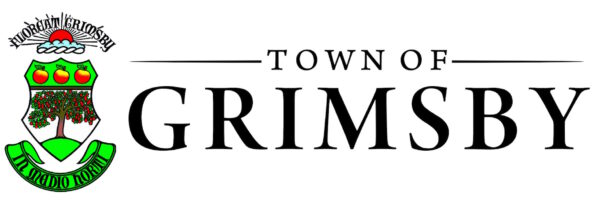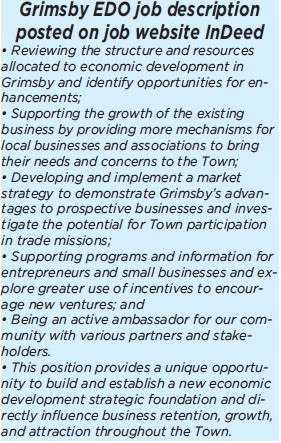
By Mike Williscraft
NewsNow
At a time when virtually all levels of government are freezing costs in anticipation of unknown impacts of COVID-19, Grimsby council opted to create several new positions as part of its 2020 budget process.
While many were contentious, none were more so debated than a new economic development officer position.
While two new hires will come in the recreation department – and a new procurement officer has already been hired – neither has a price tag near that of the EDO.
At initial budget deliberations, council, as told by chief administrative officer Harry Schlange, the new position would come with a $95,000 salary. In a subsequent meeting,
Schlange adjusted his salary estimate to $112,000-$115,000 with a budget for travel/conferences of about $35,000.
While there were not a lot of specifics where job description was concerned, Schlange noted tourism and any support for Grimsby Gateway’s tourism kiosk would not be part of any future EDO’s responsibilities.
In a lengthy interview April 15, Schlange expanded on how he sees the roll of the new EDO developing.
Following through on comments at town council, Schlange said creating relationships with Grimsby business operators and business organizations will be part of the immediate process.
Among the organizations Schlange said would be approached are:
• Grimsby Economic Development Action Committee (GEDAC);
• Grimsby Downtown Improvement Area Board;
• Niagara Region and Hamilton economic development departments;
• Niagara Region’s other seven economic development officers;
• Niagara College, Brock and McMaster University.
“There will be a strong focus on relationship management,” said Schlange.
“Niagara and Hamilton have economic development teams we can pull from to help Grimsby small- and medium-sized businesses leverage programs and grants. Often times businesses are not up to date on those kinds of things. We need to make sure we’re connected to provincial, federal and regional programs and grants.”
Another key element Schlange said needed to attract “the best and brightest” to Grimsby is the development of a marketing campaign.
“I think we need to highlight being part of the transportation corridor, the GO station coming, proximity to Educational institutions – Brock and McMaster – and the quality of life,” said Schlange.
With 90 per cent of business expansion coming from existing businesses, according to Schlange, developing an inventory of the existing business base and determining “what economic cluster they are in” will also be part of the process.
A facet of any development is also measurables, but Schlange said he did not expect anything specific to be set in that area “for some time”.
“That will evolve over time I’m looking at a longer term, a five-year range,” said Schlange.
However, he noted that the creation of the position would be considered a success if Grimsby saw a change in the ratio of commercial/residential assessment.
“It would be a success if we see a rise in non-residential assessment, but that takes time,” said Schlange, noting the current split is 88 per cent residential/12 per cent commercial/industrial.
As well, he cited a net jobs gain, the number of business visits conducted with relationships developed and the number of grants generated as other measuring sticks of success.
To achieve those successes, Schlange said an economic strategic plan is a first-year priority.
“Normally a strategic plan would be done in the first year but, with COVID, I’m not sure,” said Schlange, adding Town of Lincoln set a five-year plan while Niagara Region implemented a 10-year plan.
“We would likely go with a five-year plan and there would be pillars, but you’d need flexibility in 12-18 months.”
One “pillar” Schlange did set was an estimate of 10-12 business visits monthly by the new EDO.
“We will need a value proposition, ‘What are you going to do for me?’,” said Schlange of what needs to be established prior to the EDO meeting business operators.
“There will be research required. The EDO will have to know about a business before going in and be able to predict some of their issues. It’s not just a matter of knocking on doors.”
He said, according to Statistics Canada there are 700 businesses with staff and another 1,500 businesses without staff in Grimsby.
He also said attracting business takes 70-80 per cent more effort than enabling business expansion and it achieves 10 per cent of the return.
Because of those varying returns, Schlange said retention and expansion are expected to be main areas of focus.
“Once we have that business inventory we will have all businesses categorized. That has not been done in Grimsby before,” said Schlange.
But attracting business will still be part of any plan.
During budget discussions in February, Coun. Dave Kadwell, who is also chair of GEDAC, told council a study done by his committee had established that there are only 11 vacant commercial/industrial properties in Grimsby.
However, Schlange said the new EDO would do another study to “identify employment lands, so we can optimize them the way they should be.”
“Some businesses want to expand but have nowhere to go. In the past, I have worked with an economic development person to drive through that.”
“The EDO will develop relationships with existing property owners and see what can be done about facilitating possible sales.”
Ontario has limited rules to allow municipalities to attract business development. One tool relates to discounting development charges, which “could be expanded”, said Schlange.
Another option is tax increment financing (TIF), which levels payments for developers to improve their cash flow. This proves no reduction in fees to the Town, but slows the process of dollars coming into Town coffers.
“Mainly, time is money and a more expedited process will help the most,” said Schlange.
With the onset of COVID-19 and its all encompassing impact on Grimsby, Canada and the world, Schlange said it was important to push up the September hiring time table to get the successful candidate started as soon as possible.
“Having an EDO will accelerate our ability for outreach. We have a fantastic opportunity. Development happens when attracting businesses. We have not been proactive on that,” said Schlange.
“Businesses have been reaching out, looking for help. Having an EDO will accelerate our ability for outreach. “
Regionally, most of the measures Schlange noted regarding recovery from COVID-19 have already been set in motion by the Niagara Economic Rapid Response Team. He said the new EDO “may” take part in that process.

